Image Converter
Convert any Image to WEBP, JPG, PNG, GIF, or BMP

Want to convert your image? Try TinyTool Image Converter, With this tool, you can easily convert any Image to JPG, PNG, WEBP & other formats without losing any quality. You just need to upload your image and then select the output image format then our tool will convert your image with a click of a button. You can convert your images to JPG format or convert JPG to PNG format or convert PNG to JPG format or convert PNG to GIF format Convert GIF to PNG format or WEBP format and so on.
Image Converter Online is a versatile and user-friendly tool that can help you with all your image conversion needs. Whether you need to convert an image to a different file format, compress an image to reduce its size, or resize an image to fit a specific dimension, TinyTool has got you covered because we have all the tools you need.
What is an Image Converter?
An image converter is a software tool or online service that can convert one image file format to another. Image formats such as WEBP, JPG, PNG, GIF, and BMP all have their own unique advantages and disadvantages, and different devices and applications may require different formats for optimal performance. Image converter tools can be used to convert images between these formats, allowing for greater flexibility and compatibility across different devices and applications.
How To Convert Images?
Step 1: Upload the image in the tool.
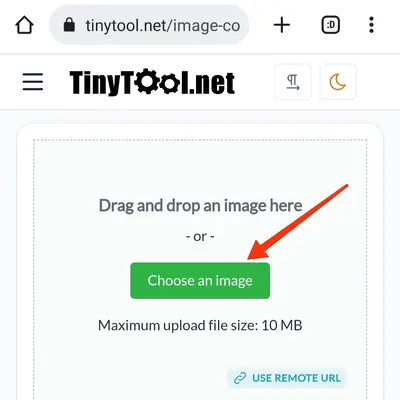
Step 2: Select the new image format.
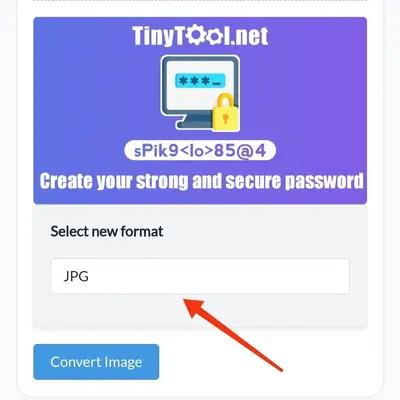
Step 3: You can choose from these formats.
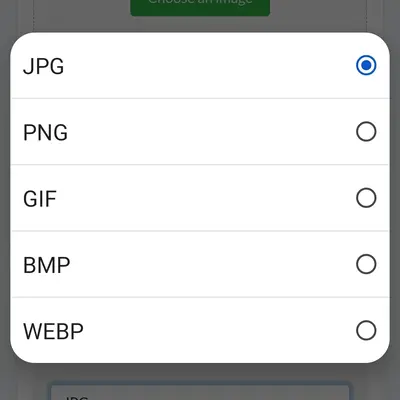
Step 4: After selecting the new format, click the Convert Image button.
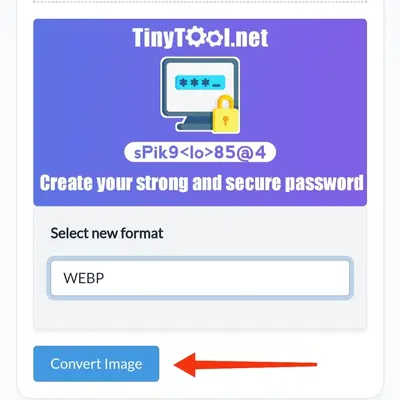
Step 5: Then the converted image will appear then click the Download Image button to download the image.
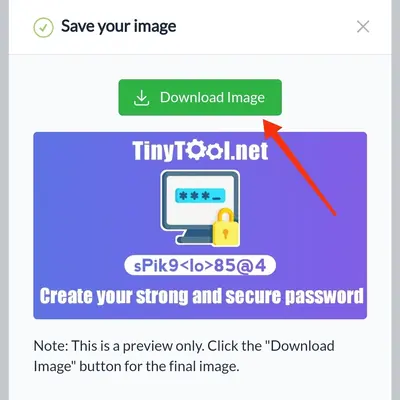
Why convert images?
Converting images can be beneficial for several reasons:
-
Compatibility: Different devices and browsers may require different image formats to display properly. Converting images to the appropriate format ensures that they can be viewed correctly on all devices.
-
Size reduction: Images can take up a lot of space on a website, which can slow down load times. Converting images to a compressed format can significantly reduce their size without sacrificing quality, leading to faster load times and better user experience.
-
Optimization: Images can be optimized for search engines by including appropriate alt text, captions, and file names. Converting images to a format that supports these optimizations can help improve website rankings.
-
Editing: Converting images to a different format can make them easier to edit using different software programs. For example, converting a JPEG image to a PNG format allows for transparent backgrounds, which can be useful for graphic design projects.
Overall, converting images can help improve website performance, user experience, and search engine rankings, while also providing more flexibility for editing and customization.
Best Image Formats for SEO?
The best image formats for SEO are those that balance image quality and file size. Here are some of the most popular image formats for SEO:
1. JPEG/JPG: JPEG is the most commonly used image format for SEO. It provides a good balance between image quality and file size. It supports millions of colors and is best suited for images that have a lot of detail or gradients.
2. PNG: PNG is a high-quality image format that supports transparency. Best suited for images with transparent backgrounds or images that require a high level of detail. However, PNG files are often larger than JPEG files.
3. WebP: WebP is a relatively new image format developed by Google. It provides high-quality images with smaller file sizes than JPEG and PNG. However, not all browsers support WebP yet.
Reduced load time of your website
As a website owner, you know how crucial it is to have a fast-loading website. According to a study by Google, 53% of mobile users will leave a site that takes longer than 3 seconds to load. This means that if your website takes too long to load, you could be losing potential customers and revenue.
This is where image converter tools come in. By compressing your images without sacrificing quality, image converter tools can significantly reduce your website's load time. This is important for several reasons:
Improved user experience: When your website loads quickly, your visitors are more likely to stay and engage with your content. Slow load times can be frustrating and can drive potential customers away.
Increased conversions: Faster load times have been shown to increase conversion rates. A study by Akamai found that a 100-millisecond delay in website load time can lead to a 7% reduction in conversion rates.
Better search engine rankings: Load time is a factor that search engines consider when ranking websites. A faster website can help improve your search engine rankings, which can lead to more traffic and potential customers.
Improved SEO
Search engine optimization (SEO) is essential for increasing website traffic and visibility. Images play an important role in SEO, as they can be optimized with alt text, captions, and file names to help search engines understand the content of a web page. Image converter tools can help improve SEO in several ways:
Image compression: Compressing images using an image converter tool can reduce their file size, which can lead to faster load times. This, in turn, can improve website ranking as Google uses page speed as a ranking factor.
Image optimization: Image converter tools can optimize images for SEO by automatically adding alt text and titles to images. This makes it easier for search engines to understand what the image is about and can improve your website's ranking for relevant search terms. If you want to learn more about image optimization then you can check out How to Optimize Your Images for Better Search Rankings.
Image format: Converting images to the appropriate format can improve their visibility on search engines. For example, JPEG and PNG formats are more SEO-friendly than BMP or TIFF formats, and talking about the WebP which google itself recommends website owners use and convert their old images to WebP because WebP is better than other image formats.
Increased User Engagement
User engagement is a crucial factor in website success. Engaged users are more likely to interact with your website, share your content, and ultimately become customers. Image converter tools can help increase user engagement in several ways:
Visual appeal: High-quality images can be visually appealing and can draw users' attention. By converting and optimizing your images, you can enhance their visual appeal and create a more engaging user experience.
Social media sharing: Social media platforms rely heavily on visual content, and optimized images can help your content stand out on these platforms. By using image converter tools to optimize your images, you can improve the likelihood of users sharing your content on social media.
Faster load times: Slow load times can be a major barrier to user engagement. By compressing your images using an image converter tool, you can significantly reduce load times, making it more likely that users will engage with your website and content.
Greater Compatibility
Incompatibility between different image file formats can be a major issue, especially when trying to share or edit images across different devices or applications. Image converter tools can help address this problem by allowing you to convert images between different formats, making them more compatible with a wider range of devices and applications.
Device compatibility: Different devices may require different image formats for optimal performance. For example, some devices may only support JPEG images, while others may require PNG or GIF formats. By converting your images to the appropriate format, you can ensure that they will display correctly on all devices.
Application compatibility: Different image editing and design applications may also require different image formats. For example, a web design application may require JPEG or PNG images, while a print design application may require TIFF or EPS formats. By converting your images to the appropriate format, you can ensure that they will work seamlessly with your chosen application.
Cross-platform compatibility: Image converter tools can also be useful for sharing images between different operating systems, such as Windows and macOS. By converting your images to a universally compatible format such as JPEG or PNG, you can ensure that they will display correctly on all operating systems.
Can I trust TinyTool to upload my images?
TinyTool.net is a well-known and esteemed website that is trusted by many users worldwide. Our platform employs various advanced security measures to ensure the confidentiality and safety of all uploaded images. Additionally, we offer the reassurance that all images will be permanently removed from our server within a few hours, further safeguarding the privacy of our users.
Conclusion
In conclusion, using an image converter tool can provide a range of benefits for individuals or businesses looking to optimize their images. By converting and optimizing images, users can improve their website's load time, improve SEO, increase user engagement, and improve compatibility across different devices and applications. So what are you waiting for start converting your images today.





